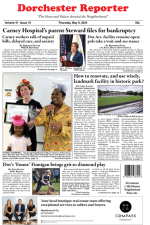April 28, 2022
Few voters might be able to answer the question of a what a lieutenant governor does in Massachusetts. The answer, according to the state constitution: Very little. (1) Step in if the governor becomes too sick to serve, dies or leaves office. (2) Sit on the Governor’s Council — an arcane body that meets a few hours a month to consider judicial nominations, pardons and commutations.
And yet, this year, it has become one of the most sought elected offices in the state.
The decision by Gov. Baker and Lt. Gov. Karyn Polito not to seek re-election has created wide-open contests to succeed them. But that’s especially true for Polito.
In fact, more people are running for lieutenant governor than for any other state office in Massachusetts.
The current crop of eight candidates includes six Democrats (state Rep. Tami Gouveia, state Sen. Adam Hinds, Salem Mayor Kim Driscoll, state Sen. Eric Lesser, businessmen Bret Bero and Scott Donohue, and two Republicans (former state Rep. Kate Campanale and former state Rep. Leah Cole Allen.)
But what’s the attraction of a job with so few official duties?
Evelyn Murphy, who was elected lieutenant governor in 1986, said the lack of clear responsibilities gave her the freedom to define the job for herself.
“I was really excited by that,” said Murphy, who became the first woman in Massachusetts history to win a constitutional office.
Lieutenant governors work in partnership with the governor, said Murphy, but they can also shape their own agendas. In her case, that meant helping cities and towns make plans for decades to come.
“What I wanted to do was create a way to use the freedom of the office to say to all the communities in the state: ‘Take a look ahead and see what you’re going to need in terms of schools, in terms of healthcare, in terms of housing, so that you’ve got a plan,’ “ said Murphy, who wanted to find ways for the state to help.
Murphy said becoming lieutenant governor also provides a good launching pad to eventually run for governor. In fact, out of 72 Massachusetts lieutenant governors, more than a third went on to serve as the state’s chief executive.
In Murphy’s case, she was an early favorite in 1990 to win the Democratic gubernatorial nomination, though her campaign faded and she eventually dropped out. But other recent lieutenant governors — including Paul Cellucci and Jane Swift — eventually made it to the corner office.
Cellucci stepped into the role after Gov. William Weld resigned in 1997 and was re-elected the following year. Jane Swift became acting governor in 2001 after Cellucci left to become US ambassador to Canada. Swift decided not to run for a full term as governor, however, after some controversies and flagging poll numbers.
Other notable success stories include John Kerry, who vaulted from lieutenant governor to US Senator, and then became secretary of state. And Calvin Coolidge, another Massachusetts lieutenant governor, went to governor then national as Warren Harding’s VP and, later, his successor.
But because the job is so loosely defined, it often attracts people with little or no political experience. This year, that includes two of the Democrats — Bero and Donohue. And back in 1994, it included Bob Massie, a grassroots organizer, running for office for the first time.
“Lieutenant governor is kind of this place where you can be creative and where unusual people can run and win the primary,” said Massie, who won the Democratic nomination that year. Massie and Mark Roosevelt went on to lose the general election to the Republican ticket of Weld and Cellucci.
But while running, Massie said he often faced the same two contradictory questions:
“Why do you believe you are qualified for the second highest office in the state? And why do you want this do-nothing job?”
Massie, though, said he viewed the job as full of potential.
In fact, the history of lieutenant governors in Massachusetts suggests that political experience matters a lot. Virtually all the winning candidates had backgrounds in politics or elective office — from Sam Adams, a founding father and one of the earliest lieutenant governors, to Karyn Polito, who holds the office now.
But that history hasn’t stopped political outsiders from taking a shot.
This article was first published by WBUR 90.9FMon April 21. The Reporter and WBUR share content through a media partnership.
Mariano likes Driscoll as Lt. Gov candidate
House Speaker Ron Mariano last month made his pick in this year’s lieutenant governor race public, backing Salem Mayor Kim Driscoll from a busy Democratic primary field that also features a sitting state rep and two senators.
Mariano said last week that Driscoll “will be a valuable partner for our work in the House and the best advocate for the cities and towns of the Commonwealth.” He pointed to her “vision for what this state can achieve in offshore wind development and job creation.”
Mariano had previously thrown his support behind Attorney General Maura Healey for governor.
– KATIE LANNAN
STATE HOUSE
NEWS SERVICE


